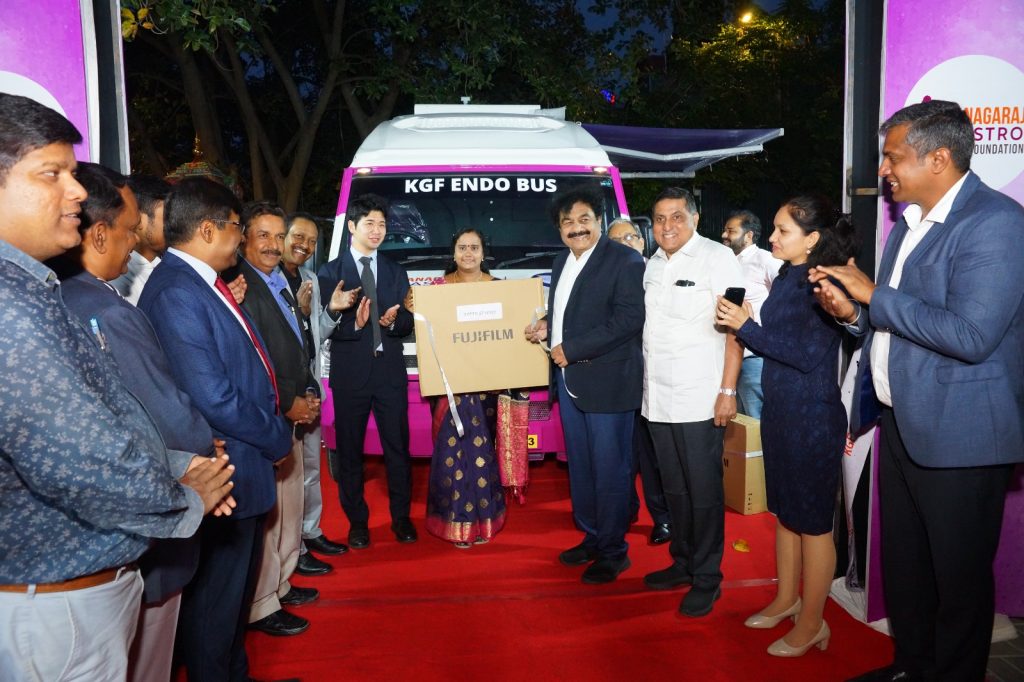FUJIFILM India Partners with GVN Hospital for Early Detection of Gastrointestinal Cancer with Mobile Endoscopy Van called EndoBus
Published on December 13, 2023

New Delhi: FUJIFILM India proudly announces its partnership with GVN Hospital to introduce a groundbreaking mobile endoscopy unit called Endo Bus, revolutionizing the early detection of gastrointestinal (GI) cancer across India. Starting from December 11, the primary focus of this philanthropic initiative is to facilitate free screening of early-stage GI cancers for economically disadvantaged patients in smaller cities and underserved regions. It will ensure that vital healthcare services are accessible to those in need, irrespective of their socio-economic status or geographical location.
Endoscopy is vital for diagnosing gastrointestinal related cancers. The procedure uses an endoscope, a tiny camera on a flexible tube, to check the GI tract by inserting it either through the mouth to see the upper part (esophagus and stomach) or through the anus to examine the lower part (large intestine & small intestines). However, underserved communities face hurdles in availing the benefit of this crucial procedure due to poor endoscopic infrastructure, lack of skilled staff, financial constraints and geographic barriers.
FUJIFILM India along with GVN Hospitals aims to reach out to the remote locations in southern region of the country where the access to healthcare is still a big challenge. Many a times due to long distance travels and unawareness among patients the GI tract lesions are missed to be detected at early stage due to no significant symptoms to the patient. With this mobile endoscopy system provided by FUJIFILM India in the Endobus, doctors will be able to perform GI endoscopy and colonoscopy using FICE technology as part of the screening and it will help in early detection of suspicious lesions. Flexible spectral Imaging Color Enhancement (FICE) is an image processing enhancement technology which generates real-time spectral images from conventional white light images through the use of special processing algorithms. FICE extracts spectral images of specific wavelength components from the original full spectral (white light) image through an image processing algorithm, then assigns a spectral wavelength component in the Red (R), Green (G) and Blue (B) spectrums, and displays the enhanced color image.
Once the patients with suspected lesions are screened, at the remote location; they will be moved to GVN hospitals for advanced diagnosis using LCI and BLI technology. The combination of an optimal light spectrum and advanced signal/image processing allows LCI to differentiate red colour tones more effectively than White Light imaging. However, High-intensity contrast imaging with BLI allows superior visualisation of superficial vascular and mucosal patterns. Focussing on the characteristics of short wavelength absorption of haemoglobin (at 410 nm) combined with specific white light spectral

colours results in improved and accurate contrast imaging.
Talking about the initiative, Mr. Koji Wada, Managing Director, FUJIFILM India, said, “Access to quality healthcare is a fundamental right that geographical or financial constraints should not limit. We believe that early detection is pivotal in combatting diseases like gastrointestinal cancer, especially in areas which have limited healthcare infrastructure. Therefore, at FUJIFILM India, our efforts extend beyond innovation. Contributing meaningfully to society has become our instinct, exemplified in our collaboration with GVN Hospital. This initiative aligns with our brand ethos of leveraging technology for the greater good, ensuring that quality healthcare reaches every corner of India.”
Mr Dheeraj Chaudhri, Head of Endoscopy Systems Division, FUJIFILM India, said, “GI cancers have been on the rise in India due to changing lifestyles. So, it has become quintessential for us to dedicate efforts toward bringing quality diagnostic services closer to people who may otherwise face challenges accessing such specialized medical care. Therefore, FUJIFILM India’s mobile endoscopy units present a promising solution to this problem. These mobile units, equipped with advanced endoscopic technology, allow for precise and efficient diagnosis while covering underserved areas, ultimately saving lives. This initiative aims to foster an environment where people are encouraged to undergo regular check-ups.”
The collaboration between FUJIFILM India and GVN Hospital is poised to address the disparities in essential healthcare services by utilizing technology and innovation, contributing to the betterment of overall well-being across the country. Both the LCI and BLI technology together aids in detection as well as characterisation of the lesions. The hospital is fully equipped with latest technologies and capable of many advance diagnostic and therapeutic procedures in gastrointestinal tract. This can significantly contribute to lower the rate of advance stage cancers and other serious GI disorders in these remote regions, thus lowering the mortality rate and saving lives. GVN Hospitals along with FUJIFILM India aims to support the underprivileged and improve their quality of life.



















